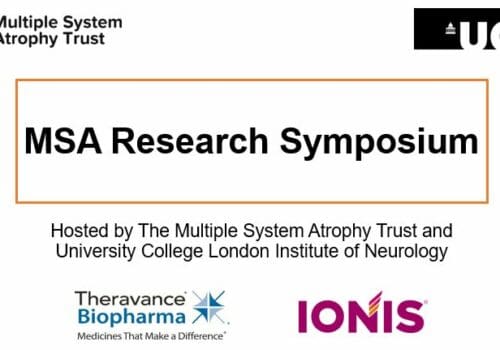2020 Research Grants Blog Series – Part 2
Here is the second in our blog series on the new research projects MSA trust will be supporting later this year. John Telford, lay advisor on our Scientific Advisory Panel, writes about the second award:
Disrupted genetic instructions …
The lead researcher for this project is Dr Conceição Bettencourt who is a Postdoctoral Research Associate at the UCL Institute of Neurology working with Prof. Janice Holton’s lab. She has been working in the field of DNA methylation for several years because it has been found that this process is significantly and deleteriously affected in MSA. What is going on? And could it be put right?
So what is DNA methylation and why is it important?
DNA – which is organised into 46 chromosomes – is the instruction manual for making protein molecules which are the agents for making a cell do what it is supposed to do. The DNA is identical in every cell in the body so theoretically every cell can produce all 20,000 plus proteins. But clearly a further set of instructions is needed so that only the appropriate genes for a particular type of cell – a heart cell or a nerve cell, say – get switched on to make just the right set of proteins for that context. A major way in which this is done is through methylation. This is the attachment of the biochemical methyl group to appropriate places along the DNA chain, determining which genes are active and to what extent.
In MSA and other diseases the pattern of methylation becomes changed so that some proteins are produced when they shouldn’t be, or they are produced in the wrong amounts or not produced at all when they should be.
Why is this important for MSA?
Much more needs to be known about the molecular changes involved in MSA pathology – the details of what happens, what precedes what and what causes what. Changes in DNA methylation mirror the pathological chain of events. In some cases a methylation change could be the cause of other events and in other cases the consequence. There are also differences in these chains of events between different but related diseases, for instance between MSA, Parkinson’s and PSP. There are also methylation differences between the different areas of the brain that are affected in MSA. MSA pathology is highly complex and needs further teasing out. Studying methylation differences has already yielded a lot of preliminary information and this project is aimed at making important advances from here.
A fuller understanding of the pathological pathways are likely to beneficial in two main ways. First, discerning different patterns for methylation in different diseases – and in the different types of MSA – could provide a more accurate way of diagnosing that someone had MSA rather than Parkinson’s, for instance.
Second, and more importantly for the MSA patient, a good understanding of the disease pathology could point to targets for drug intervention for treating the disease, slowing its progress or reducing its symptoms. Because methylation is a reversible process, harmful protein imbalances caused by it maybe could be corrected. Also it could be that faulty methylation is what makes certain brain cells more vulnerable to the build-up of aberrant forms of the protein alpha-synuclein – the condition that is characteristic of both MSA and Parkinson’s. Correcting the faulty methylation could provide a defence against further alpha-synuclein build-up.
How does the team intend to explore methylation in practical terms?
The project is based on analysing post-mortem brain tissue from samples held in the Queen Square Brain Bank. Much of the sampling has already been done and a mass of data has been accumulated which the project will analyse alongside new data. The patterns or signatures of methylation encompassing thousands of genetic sites will be determined and comparisons will be made between the samples from MSA, Parkinson’s and PSP patients and non-diseased persons. This will also take account of the severity and stage of disease reached so that a detailed picture of the progression of the changes can be built up.
The members of the team and their collaborators cover a huge range of expertise including epigenetics, transcriptomics, bioinformatics, neuropathology, biochemistry and neurology making them well-placed to successfully deliver the objectives of the project.
Disclaimer: The views and opinions expressed in the blogs published on these pages are those of the authors and do not necessarily reflect the official policy or position of the MSA Trust.




